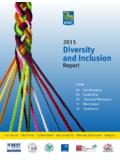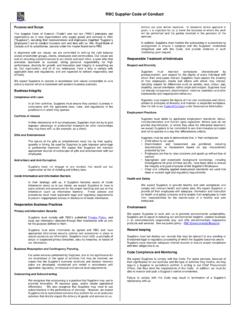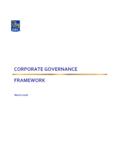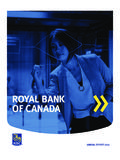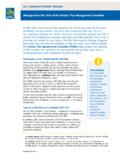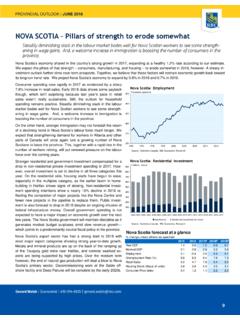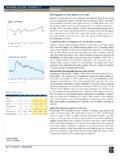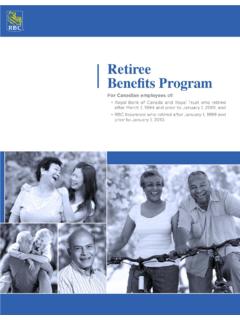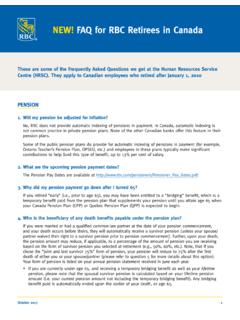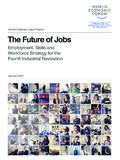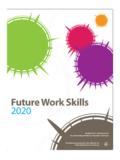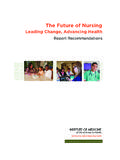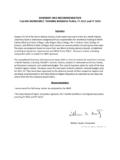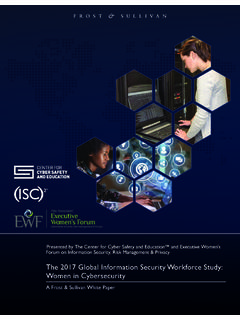Transcription of THE COMING SKILLS REVOLUTION Humans Wanted
1 Humans WantedHow Canadian youth can thrive in the age of disruptionTHE COMING SKILLS REVOLUTIONCANADA, WE HAVE A PROBLEM. We re hurtling towards the 2020s with perfect hindsight, not seeing what s clearly before us. The next generation is entering the workforce at a time of profound economic, social and technological change. We know it. Canada s youth know it. And we re not doing enough about wants to change the conversation, to help Canadian youth own the 2020s and beyond. RBC Future Launch is our 10-year commitment to that cause, to help young people prepare for and navigate a new world of work that, we believe, will fundamentally reshape Canada. For the better. If we get a few big things report, based on a year-long research project, is designed to help that conversation. Our team conducted one of the biggest labour force data projects in Canada, and crisscrossed the country to speak with students and workers in their early careers, with educators and policymakers, and with employers in every sector.
2 We discovered a quiet crisis of recent graduates who are overqualified for the jobs they re in, of unemployed youth who weren t trained for the jobs that are out there, and young Canadians everywhere who feel they aren t ready for the future of work. Too many have been trained for jobs that may go away rather than equipped with SKILLS that will be ever more valuable. We all bear responsibility to change that. As employers, we need to rethink the way we hire, retrain and continuously reshape our workforces. As educators, we need to think beyond degrees and certificates. As governments, we need to take advantage of the world of instant information to harness the COMING SKILLS REVOLUTION . And young Canadians everywhere need to seize the moment, to demand more of Canada and more of age of automation need not be a threat. If we apply our humanity to be creative, critical and collaborative it can be a competitive advantage. If we find new ways to support and unleash the SKILLS of Canada s youth, they ll launch an amazing future for themselves, and for all of of jobs, not enough skillsA Quiet CrisisFROM THE CEODave McKay, President and CEO, RBC2 | Humans Wanted , 20181.
3 More than 25% of Canadian jobs will be heavily disrupted by technology in the COMING decade. Fully half will go through a significant overhaul of the SKILLS An assessment of 20,000 SKILLS rankings across 300 occupations and million expected job openings shows an increasing demand for foundational SKILLS such as critical thinking, co-ordination, social perceptiveness, active listening and complex problem Despite projected heavy job displacement in many sectors and occupations, the Canadian economy is expected to add million jobs over the next four years, all of which will require this new mix of Canada s education system, training programs and labour market initiatives are inadequately designed to help Canadian youth navigate this new SKILLS Canadian employers are generally not prepared, through hiring, training or retraining, to recruit and develop the SKILLS needed to make their organizations more competitive in a digital economy.
4 6. Our researchers identified a new way of grouping jobs into six clusters, based on essential SKILLS by occupation rather than by By focusing on the foundational SKILLS required within each of these clusters, a high degree of mobility is possible between jobs. 8. Digital fluency will be essential to all new jobs. This does not mean we need a nation of coders, but a nation that is digitally Global competencies like cultural awareness, language, and adaptability will be in Virtually all job openings will place significant importance on judgment and decision making and more than two thirds will value an ability to manage people and We FoundLearnings from our cross-country research projectEXECUTIVE SUMMARYP ublished by RBC | 31. What if employers agreed to hire for core SKILLS over credentials?2. What if employees, employers and governments contributed to lifelong learning funds to finance reskilling, the way we finance retirement?
5 3. What if all post-secondary institutions agreed to a national goal of exposing 100 percent of undergraduate students to meaningful work-integrated learning placements? 4. What if foundational SKILLS and career planning were built into K-12 programs across the country, and measured for their achievement?5. What if Ottawa and the provinces designed SKILLS and employment programs specifically for people under the age of 30? 6. What if governments and employers agreed to a new national digital platform for SKILLS and jobs information? 7. What if, together, we recognized the COMING SKILLS REVOLUTION as critical to the future of Canada?What If ..?A CALL TO ACTION4 | Humans Wanted , 2018A MOBILE, SKILLED workforce , constantly learning, training and upgrading to meet the demands of a changing world: That s a SKILLS young Canadians to flourish at a time of profound economic, social and technological change, we need to make this mobility a priority.
6 We need to understand how young Canadians can move within and between jobs. How they can always be training for what comes comprehensive data project analyzing the changing demand for Canadian SKILLS looks past the standard economic data and digs into the work Canadians actually do: hundreds of common but disparate occupations identified by the federal government. It shows that these occupations are connected by the SKILLS required to do them. SKILLS that range from reading and critical thinking to systems analysis and technology design, each bearing its own importance in any given line of occupations can be grouped into six broad clusters, which we ve called Solvers, Providers, Facilitators, Technicians, Crafters and Doers. The clusters aren t grouped by industry, educational attainment, collar colour or income; they re grouped by the SKILLS required to do the work. This allows us to see how SKILLS apply across a wide range of jobs, and how young people might be able to move from one profession to another by upgrading just a small number of SKILLS .
7 Out of 35 foundational workplace SKILLS , it takes upgrading just four SKILLS , for example, for someone in the Facilitator cluster to transition from dental assistant to graphic designer. Of course some transitions between professions will require time, money and a personal commitment to bridging certain knowledge gaps and it s no small thing to be constantly upgrading SKILLS . Young Canadians will have to find the transitions that work for them. Not every dental assistant has the aptitude or desire to become a graphic following page shows the six clusters and their SKILLS emphasis, their susceptibility to automation, and examples of career transitions that can occur within each. This gives us a new understanding of how young Canadians can discover career paths, acquire SKILLS and upgrade them. We ve also used market forecasting to show which clusters stack up well against labour demand, and automation projections to show which clusters face the most risk of young Canadians can tap into these SKILLS foundations and mobility potential, they can make unexpected leaps within their clusters, and New MobilityLIFELONG LEARNINGP ublished by RBC | 5 How young Canadians can prepare for what s COMING nextA SKILLS EconomyWe ve grouped the Canadian economy into six clusters based on essential skillsets: a roadmap for Canada s next generationTHE FUTURE OF WORKP ossible Transition: Greenhouse Worker to Crane Operator [1]* Between 2018 and 2021[1] Possible job transition within a cluster6 | Humans Wanted , 2018 CraftersPossible Transition: Farmer to PlumberVery High Probability of DisruptionTechniciansMedium in Technical SkillsLow in Management Skills360,000 Job Openings*High in Technical SkillsPossible Transition.
8 Car Mechanic to Electrician130,000 Job Openings*See more information about each cluster on page 18 DoersEmphasis on Basic SkillsHigh Probability of Disruption110,000 Job Openings*Moderate Probability of DisruptionPublished by RBC | 7 SolversPossible Transition: Mathematician to Software EngineerEmphasis on Management SKILLS and Critical ThinkingMinimal Probability of Disruption350,000 Job Openings*ProvidersPossible Transition: Real Estate Agent to Police OfficerHigh in Analytical SkillsLow Probability of Disruption850,000 Job Openings*Possible Transition: Car Mechanic to ElectricianFacilitatorsPossible Transition: Dental Assistant to Graphic DesignerEmphasis on Emotional IntelligenceModerate Probability of Disruption570,000 Job Openings*Human After AllCanadian youth are entering the world of work just as it s being transformed. Among them is a cohort that is ready to bene t from change they are staying ahead of disruption, and making bold transitions. Meet the role models for Canada s future economy of skillsTHE NEW FACE OF WORK8 | Humans Wanted , 2018 Published by RBC | 910 | Humans Wanted , 2018 IMAGINE A YOUNG UNIVERSITY DROPOUT.
9 He reads meters for a utility company but new technology threatens to eliminate his job. He doesn t have the SKILLS for other positions available at the utility. His career is in trouble before it s even generation of Canadian youth could be staring down similar fates. But meter readers won t be the only ones under threat as the 21st-century workplace is , mining, graphic design, radiology, surveying, farming, sales in the new workplace, every occupation can be disrupted. Older generations have faced their own disruptions, of course, but they did not face such a fundamental rethinking of work as Canadians in their late teens and 20s are confronting today. To help Canada s next generation do the disrupting instead of being disrupted, we need to start with 21st-century SKILLS SKILLS they can use to grasp new opportunities and surf the waves of technology and innovation that are changing the world. We need to stop telling them that work revolves only around degrees, qualifications and jobs.
10 We need to understand how to build something different: an economy and society based on research will contribute to that understanding. We Wanted to establish hard facts about SKILLS in the Canadian workplace, and envision ways to move forward. And we Wanted to seek lessons in the experiences of those who are already trying to push those spoke to employers, policymakers, educators, career counsellors and young Canadians across the country to understand what our future SKILLS economy can look like. We also crunched data for nearly 300 typical occupations to draw lessons about how to get the data, our researchers identified a new way to group occupations not by industry or educational requirements but by the essential SKILLS required to do the job. We established six clear clusters of occupations each one placing emphasis on specific SKILLS from the Solvers who are critical thinkers such as architects or mechanical engineers, to the Facilitators who require emotional intelligence and include administrative assistants and Uber drivers.
